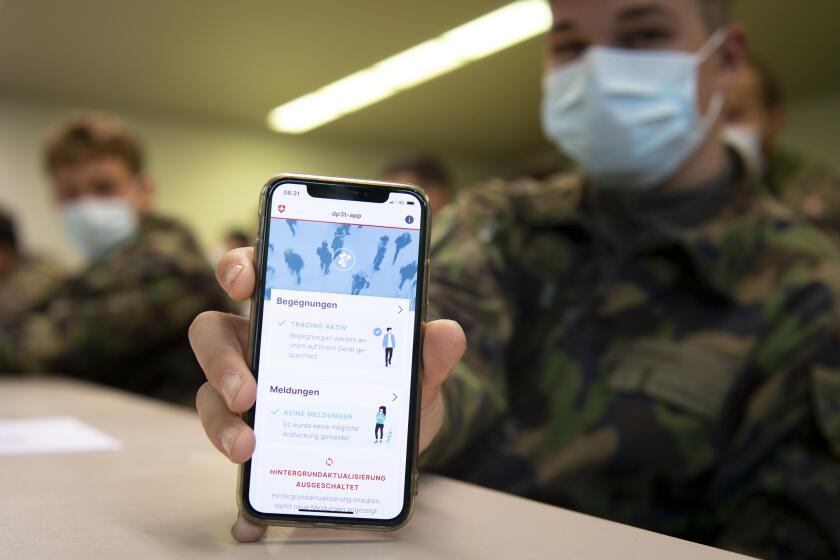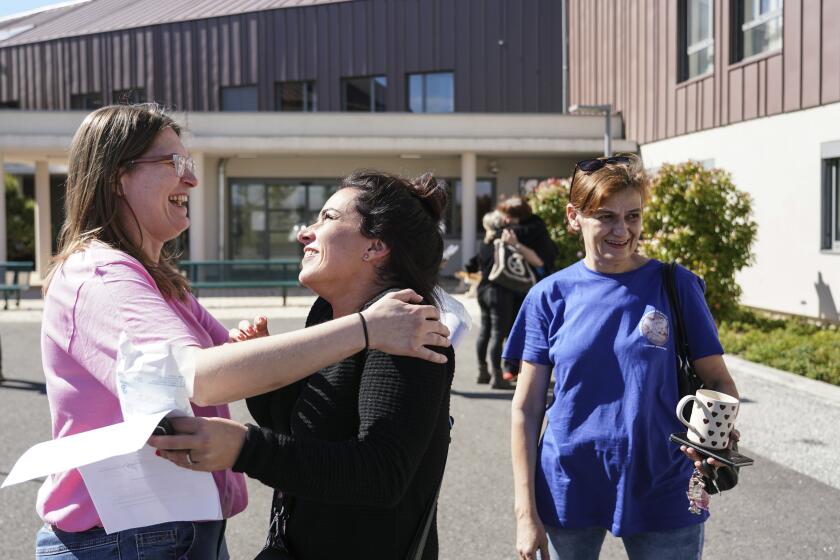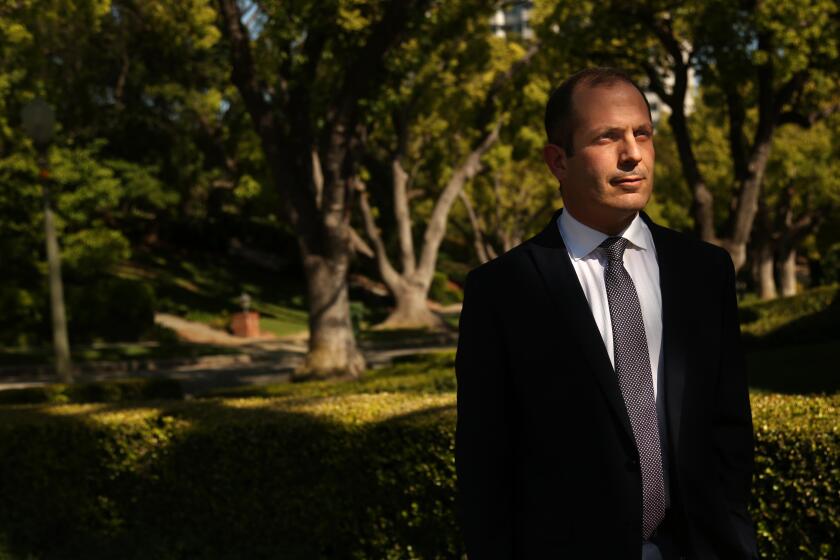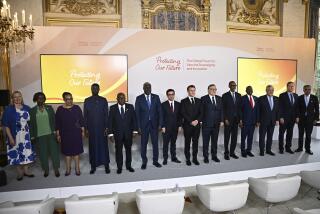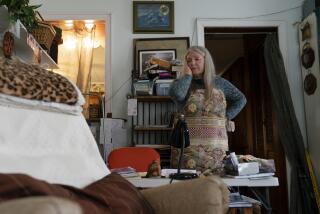World leaders pledge billions for coronavirus vaccine research
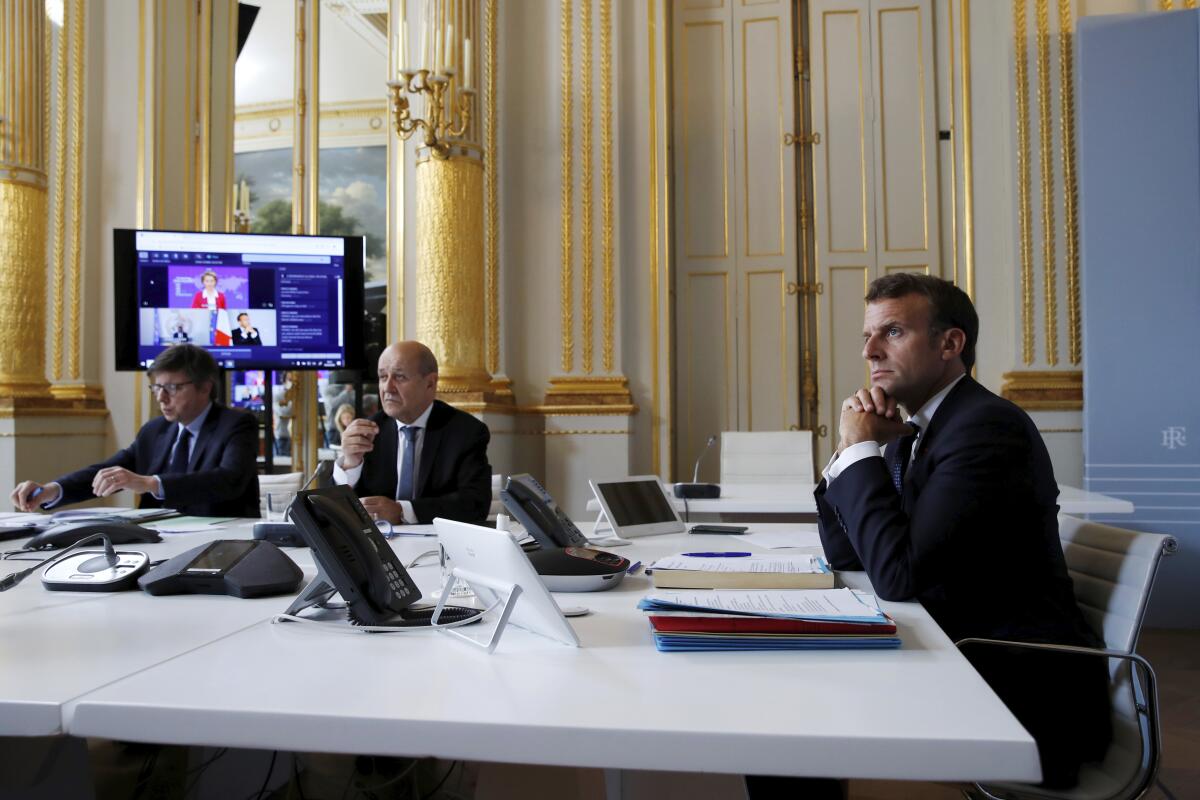
- Share via
BRUSSELS — World leaders, organizations and banks on Monday pledged 7.4 billion euros ($8 billion) for research to find a vaccine against the coronavirus, but warned that it is just the start of an effort that must be sustained over time to beat the disease.
The funds, pledged at a video-conference summit hosted by the European Union, fell marginally short of the 7.5 billion euros being sought, but more money could arrive in coming days. Notably absent from the event was the United States, where more than 67,000 people have died, and Russia.
Despite the shortfall, United Nations Secretary-General Antonio Guterres said, the target being sought Monday to help find a vaccine, new treatments and better tests for the disease would only ever amount to a “down-payment” on the tools that will be needed to fight the virus.
“To reach everyone, everywhere, we likely need five times that amount,” Guterres said.
Governments have reported around 3.5 million infections and more than 247,000 deaths from the virus, according to a count by Johns Hopkins University. But deliberately concealed outbreaks, low testing rates and the strain on healthcare systems mean the true scale of the pandemic is much greater.
People in many countries across the globe, and notably in Europe this week, are cautiously returning to work but authorities remain wary of a second wave of infections, and a vaccine is the only real golden bullet to allow something like normal life to resume.
As European governments race to develop mobile tracing apps to manage coronavirus infections, privacy remains a major concern.
“In the space of just a few hours we have collectively pledged 7.4 billion euros [$8 billion] for vaccines, diagnostics and treatments,” European Commission President Ursula von der Leyen said, wrapping up the event after three hours. “All this money will help kick-start unprecedented global cooperation.”
The original aim was to gather around $4.37 billion for vaccine research, some $2.18 billion for treatments and $1.64 billion for testing.
The pledges were hard to track, beyond coming in various currencies. Some countries announced money for their own national research efforts combined with those they would offer to international organizations. Others also proposed a mix of loans with their funding. Pledges made toward vaccine research since Jan. 30 were also counted.
Apart from many European leaders, heads of state and government from Australia, Canada, Israel, Japan, Jordan, South Africa and Turkey spoke at the event, along with China’s EU ambassador.
President Emmanuel Macron warned that “a race against time is underway,” as he donated $545 million on behalf of France.
As the coronavirus scythed through French nursing homes, one took drastic action to save its residents — and succeeded.
British Prime Minister Boris Johnson said that “the race to discover the vaccine to defeat this virus is not a competition between countries, but the most urgent shared endeavor of our lifetimes.”
Among the larger contributions, Japan pledged more than $800 million while Germany offered $572 million. Italy and Spain, perhaps the hardest hit by the virus in Europe, each said they would provide more than $109 million. Switzerland, the Netherlands and Israel also pledged $412 million, $209 million and $60 million, respectively.
Melinda Gates, co-chair of the Bill and Melinda Gates Foundation, said that beating the virus “will take more than making a vaccine available to the very highest bidder. It is going to take more than delivering it only to people in wealthy nations. The pandemic won’t end until people everywhere can be immunized against it.”
About 100 research groups are pursuing vaccines, with nearly a dozen in early stages of human trials or poised to start. But so far there’s no way to predict which — if any — vaccine will work safely, or even to name a front-runner.
Dr. Anthony Fauci, the U.S. government’s top expert, has cautioned that even if everything goes perfectly, developing a vaccine in 12 to 18 months would set a record for speed.
The coronavirus outbreak has put science on hold. Now there are discoveries that may never be made and patients who will miss the chance at a breakthrough cure.
Even if a first useful vaccine is identified, there won’t be enough for everyone initially. A growing number of vaccine makers say they’re already starting to brew tons of doses — wasting millions of dollars if they bet on the wrong candidate but shaving a few months off mass vaccinations if their choice pans out.
Asked about the U.S. absence, which comes after it suspended funding to the World Health Organization, a senior official said that “the United States is in the process of providing $2.4 billion in global health, humanitarian, and economic assistance towards the COVID-19 response, and we continue to ensure that the substantial U.S. funding and scientific efforts on this front remain an essential and coordinated part of this worldwide effort against COVID-19.”
The official wasn’t authorized to discuss the matter by name and spoke on condition of anonymity.
Macron said he is confident that the U.S. will join the initiative at some point, stressing that he personally discussed the issue with President Trump. Macron noted that the U.S. “is on the sidelines” but added that it doesn’t compromise or slow down the project.
More to Read
Sign up for Essential California
The most important California stories and recommendations in your inbox every morning.
You may occasionally receive promotional content from the Los Angeles Times.
